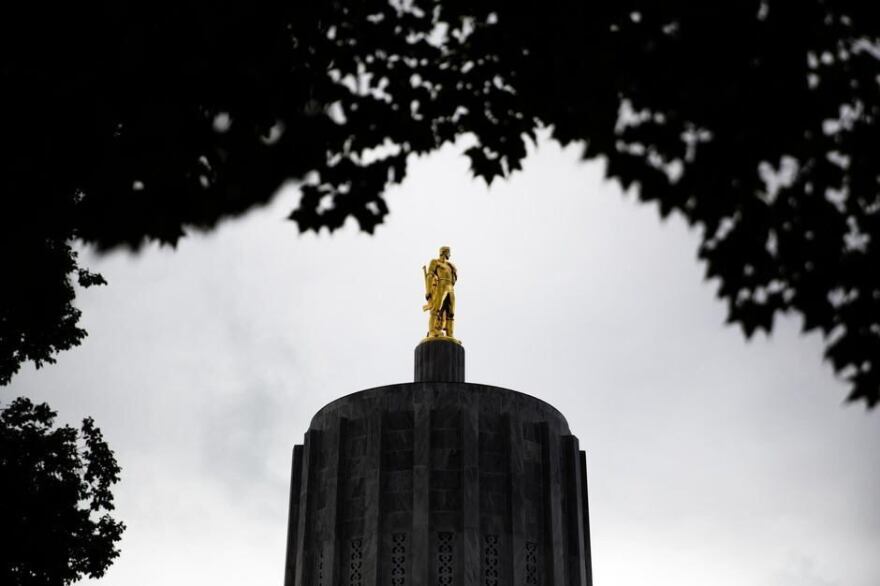The state of Oregon is now expected to send nearly $4 billion back to taxpayers next year, as forecast revenues continue to soar past economist’s initial expectations.
At the same time, economists said Wednesday that they’re deeply uncertain about what coming months will bring for Oregon tax collections, and that a recession remains a real possibility after years of surging revenue.
“Although we are now expecting more resources, it still makes a lot of sense to be prudent,” State Economist Mark McMullen told legislators in a quarterly revenue forecast.
Despite that caution, McMullen offered up a heartening near-term outlook for lawmakers as they begin to craft a budget for the next two years.
Economists say personal and corporate income taxes should come in hundreds of millions of dollars higher than they expected just three months ago, a factor driven in part by high-income earners. They told lawmakers to tentatively plan to have $696 million more than anticipated earlier as they identify spending priorities for the two-year budget that will begin in July. The state now expects to have roughly $31.5 billion to spend between general fund and lottery resources in the 2023-25 biennium.
Still, McMullen cautioned that the coming months will be the true test of whether that money comes in.
“All bets are off until we start to see what the… tax season looks like,” he said.
At the same time, what was already expected to be a record “kicker” refund back to taxpayers has ballooned even further. A unique Oregon law refunds all personal income taxes that come in above initial expectations, provided those receipts are at least 2% higher than lawmakers anticipated when building a budget.
Predicting revenues within that 2% “sweet spot” threshold has proven impossible of late, and Oregon has seen the kicker law triggered in each of the past five biennial budgets.
But the state has never sent as much back to taxpayers as economists expect will be awarded during next year’s tax season. The personal income tax kicker is projected at $3.94 billion, up from $3.68 billion three months ago. The money would be returned as a credit when Oregonians file their taxes next year.
That kicker could become subject to a political tug-of-war in coming months. Republicans have said repeatedly they suspect Democrats might seek to claw back some of the expected refund in order to pay for their priorities. No such proposal has emerged from Gov. Tina Kotek or the Democrats who lead the House and Senate.
Economists on Wednesday continued to warn lawmakers that years of relatively plush budgets are likely coming to an end. But McMullen said his office had softened its expectation that a mild recession was on the horizon, because federal efforts to slow inflation are having a positive impact. Still, he said, the risk of a recession remains high, creating the possibility of job losses and flagging tax revenues in coming years.
The forecast also cautioned lawmakers that some factors that have led to surprising tax receipts are expected to wind down. High-income earners have seemed to shift their tax burden to recent tax seasons – for instance, selling stocks and paying a capital gains tax – in expectation of potential tax increases, McMullen said. Capital gains receipts were up 77% in tax year 2021, compared to the year before. That could mean a big drop in coming years.
“There is a bill that comes to pay here,” McMullen said.
For now, though, the state’s budget picture has improved. The nearly $700 million in anticipated additional revenues would cover an estimated $559.2 million shortfall state analysts have said could emerge in the next budget.
Even so, Democrats and Republicans alike on Wednesday signaled they would proceed with caution.
“While this is encouraging news, the legislature still has some tough choices to make,” Kotek said in a statement. “We will have to keep focused and stay the course in order to make much-needed investments in Oregonians’ most urgent shared priorities: housing and homelessness, behavioral health, and education.”
Kotek has already proposed that lawmakers forgo regular payments into the state’s reserve funds in the next budget in order to access $765 million that would otherwise flow into savings.
Legislative leaders followed Kotek’s lead Wednesday.
“While the state remains in a shortfall environment, today’s forecast better positions the legislature to address [housing and behavioral health] and make meaningful investments in education,” House Speaker Dan Rayfield, D-Corvallis, said in a statement. “We must remain prudent in our budgeting.”
Senate President Rob Wagner, D-Lake Oswego, called the forecast encouraging, but said lawmakers “still need to be cautious.”
Republican leaders, meanwhile, cheered on the news that even more money would return to taxpayers in the form of the “kicker” – and warned Democrats against attempting to reduce the amount of the refund.
“”We must return Oregon’s ‘kicker’ back into the hands of hardworking Oregonians,” House Minority Leader Vikki Breese-Iverson, a Prineville Republican, said in a statement. “While my Pendleton friends would say ‘let ‘er buck,’ I say ‘let ‘er kick.’”
Breese-Iverson also signaled opposition to Kotek’s proposal to divert payments into state reserves.
Meanwhile Senate Minority Leader Tim Knopp, a Bend Republican, meanwhile, touted his proposal to issue kicker refunds in the form of a check, rather than as a credit on next year’s tax returns. It is unclear whether majority Democrats have any desire to pursue that proposal, Senate Bill 990.
Copyright 2023 Oregon Public Broadcasting. To see more, visit Oregon Public Broadcasting.



